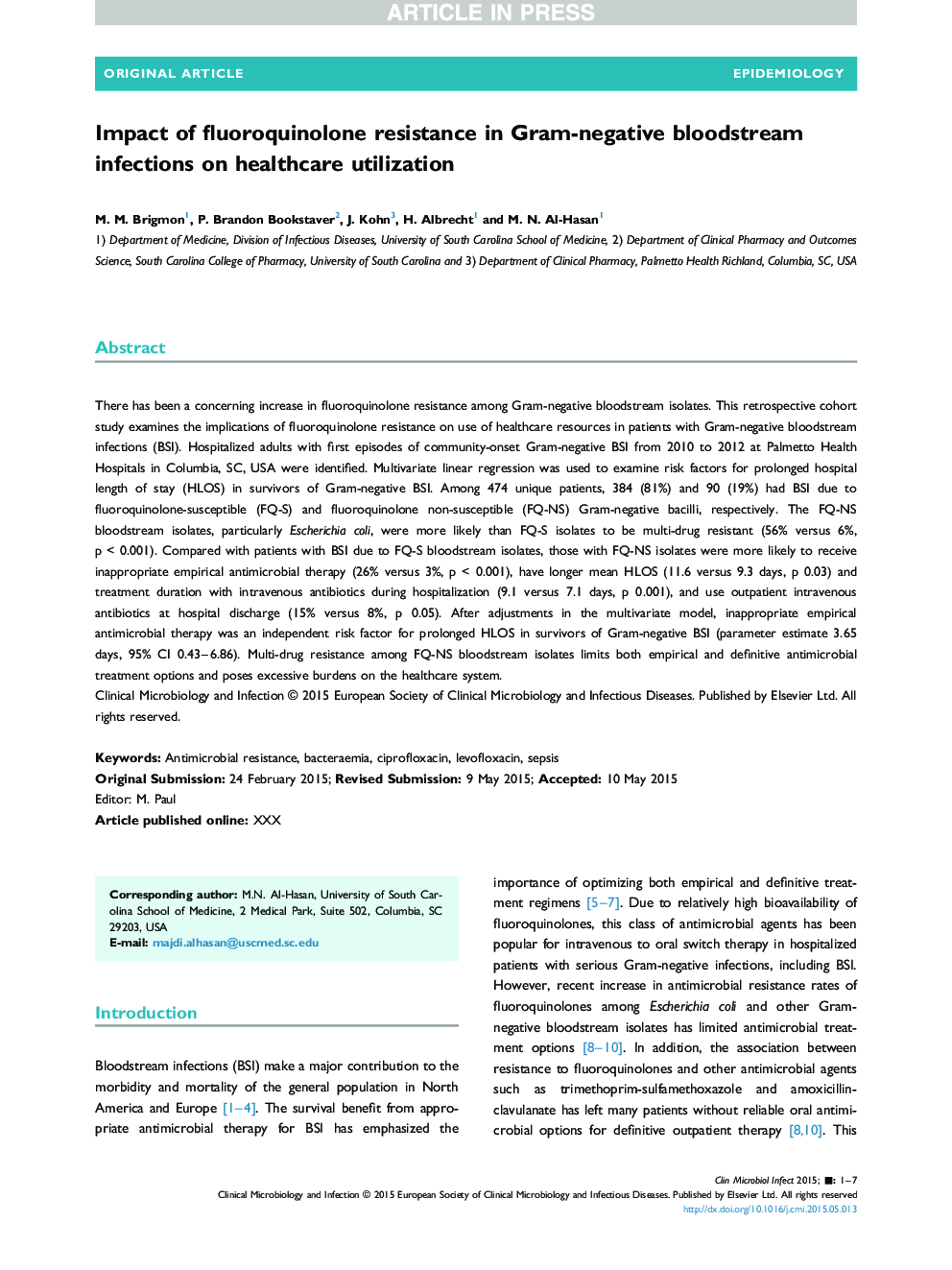| کد مقاله | کد نشریه | سال انتشار | مقاله انگلیسی | نسخه تمام متن |
|---|---|---|---|---|
| 6129281 | 1222154 | 2015 | 7 صفحه PDF | دانلود رایگان |
عنوان انگلیسی مقاله ISI
Impact of fluoroquinolone resistance in Gram-negative bloodstream infections on healthcare utilization
ترجمه فارسی عنوان
تأثیر مقاومت فلوروکینولون در عفونتهای جریان خون گرمی منفی بر استفاده از مراقبت های بهداشتی
دانلود مقاله + سفارش ترجمه
دانلود مقاله ISI انگلیسی
رایگان برای ایرانیان
کلمات کلیدی
مقاومت ضد میکروبی، باکترمیوم سیپروفلوکساسین، لووفلوکساسین، سپسیس،
موضوعات مرتبط
علوم زیستی و بیوفناوری
ایمنی شناسی و میکروب شناسی
میکروب شناسی
چکیده انگلیسی
There has been a concerning increase in fluoroquinolone resistance among Gram-negative bloodstream isolates. This retrospective cohort study examines the implications of fluoroquinolone resistance on use of healthcare resources in patients with Gram-negative bloodstream infections (BSI). Hospitalized adults with first episodes of community-onset Gram-negative BSI from 2010 to 2012 at Palmetto Health Hospitals in Columbia, SC, USA were identified. Multivariate linear regression was used to examine risk factors for prolonged hospital length of stay (HLOS) in survivors of Gram-negative BSI. Among 474 unique patients, 384 (81%) and 90 (19%) had BSI due to fluoroquinolone-susceptible (FQ-S) and fluoroquinolone non-susceptible (FQ-NS) Gram-negative bacilli, respectively. The FQ-NS bloodstream isolates, particularly Escherichia coli, were more likely than FQ-S isolates to be multi-drug resistant (56% versus 6%, p < 0.001). Compared with patients with BSI due to FQ-S bloodstream isolates, those with FQ-NS isolates were more likely to receive inappropriate empirical antimicrobial therapy (26% versus 3%, p < 0.001), have longer mean HLOS (11.6 versus 9.3 days, p 0.03) and treatment duration with intravenous antibiotics during hospitalization (9.1 versus 7.1 days, p 0.001), and use outpatient intravenous antibiotics at hospital discharge (15% versus 8%, p 0.05). After adjustments in the multivariate model, inappropriate empirical antimicrobial therapy was an independent risk factor for prolonged HLOS in survivors of Gram-negative BSI (parameter estimate 3.65 days, 95% CI 0.43-6.86). Multi-drug resistance among FQ-NS bloodstream isolates limits both empirical and definitive antimicrobial treatment options and poses excessive burdens on the healthcare system.
ناشر
Database: Elsevier - ScienceDirect (ساینس دایرکت)
Journal: Clinical Microbiology and Infection - Volume 21, Issue 9, September 2015, Pages 843-849
Journal: Clinical Microbiology and Infection - Volume 21, Issue 9, September 2015, Pages 843-849
نویسندگان
M.M. Brigmon, P. Brandon Bookstaver, J. Kohn, H. Albrecht, M.N. Al-Hasan,
